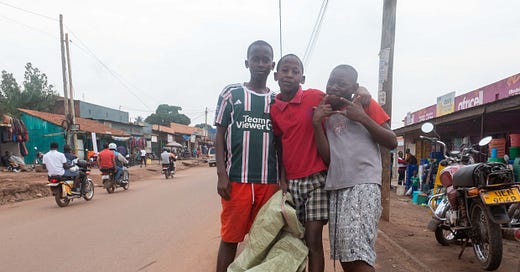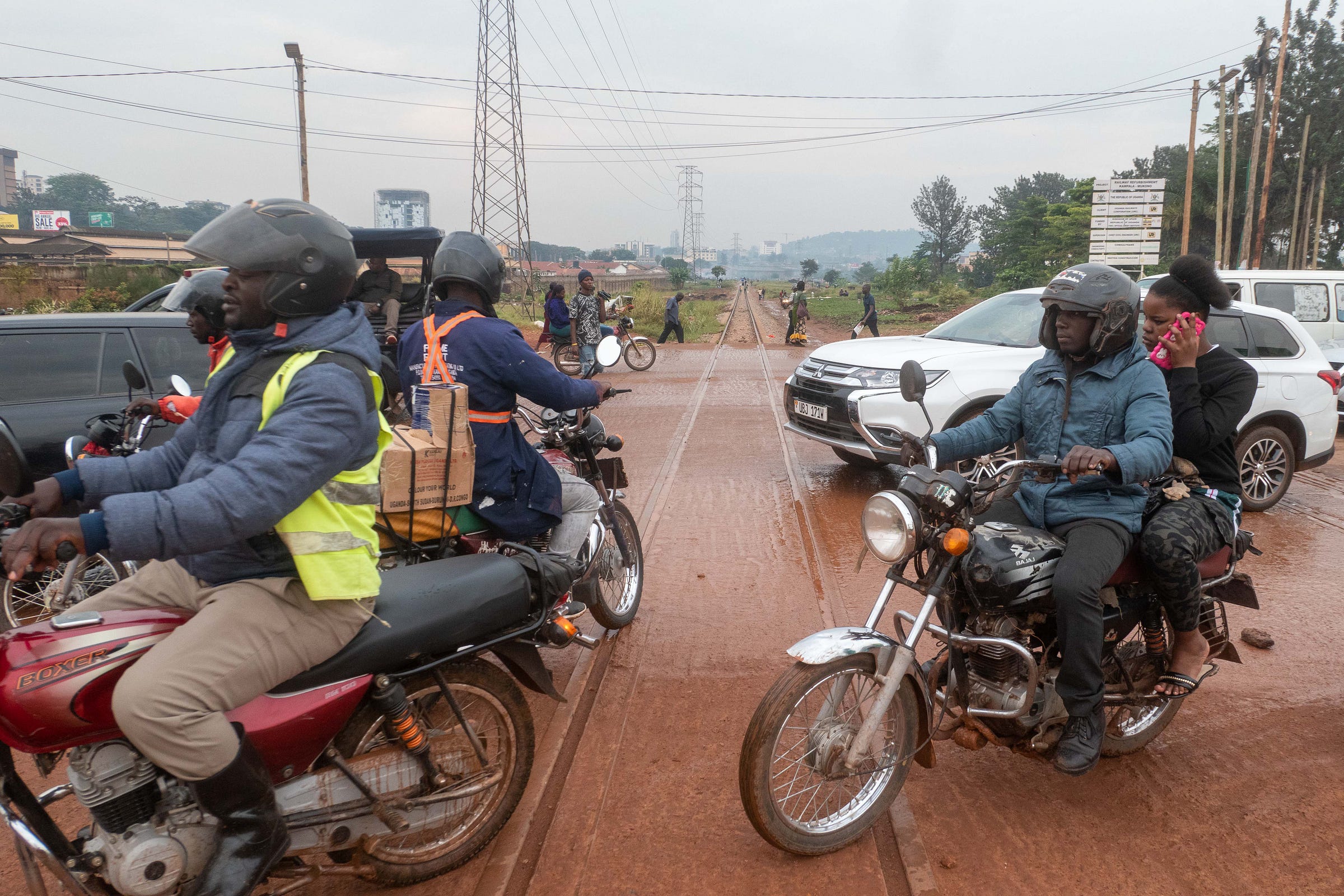(There is so much to write about Kampala. So this is the first of what I hope is three posts.)
I wasn’t surprised the first song I heard in Kampala was an old American one. I wouldn’t have guessed it was one by Patty Loveless though. Yet it soon made sense, because Christopher, my cabbie for the drive into the city1, fit every Country Music fan stereotype: He loved God, his family, and his country, although in this case, Uganda not the USA.
He also loved beer, so he was open to the idea of stopping for one, or maybe two or even three, at one of the roadside clubs. He was further sold on the idea because there was an Euro cup game going on he wanted to watch, although he didn’t say that. Instead he said he wanted to make sure I was safe. “It’s better you have a beer here. Not downtown. Downtown has many many prostitutes. They will rob you.”
So we stopped at a club that I have no idea why he chose. We passed hundreds that looked the same: a wood, brick, tin shack with a hand painted sign out front, a TV and fridge inside, and a sound system that costs more than everything else combined. A system so loud you could hear it from the road twenty yards away — an accomplishment given the other noises. It wasn’t for the ease of parking. That required two boys to help him navigate the open pits, junk piles, and men lounging in the dirt field fronting the club. It also didn’t seem to address his prostitution concerns, although I might have misjudged the four salaciously dressed young women lounging around, playing Candy Crush, and eyeing me like a giant white ATM. If so, I apologize, and I’ll re-calibrate my global prostitution model.
An hour later I was at my downtown hotel, loopy from thirty-five hours without sleep, but giddy to have made it, to have navigated two flight delays, a dysfunctional but kind passport control, and finally able to sit down to a meal. But that, I was told, didn’t exist downtown at 9 p.m. Not according to Google, Yelp, or Rita at the front desk. She suggested I eat in the hotel restaurant, and she, like Christopher, scolded me for even thinking about going out, especially to the one listed bar, Top Pub, a quarter of a mile away, “Do not go. That is very dangerous. Bad women who will rob you. Bad men who will kill you.”
The hotel restaurant was open, although it took an hour and half for my grilled chicken and rice to arrive. When it did, I was past done for the evening.
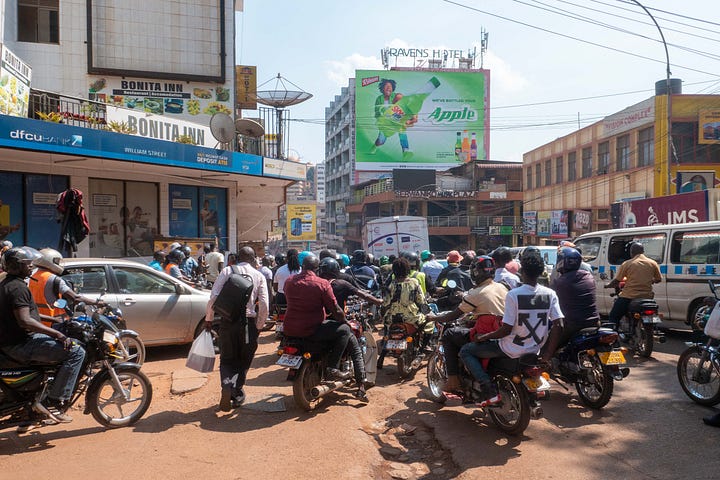

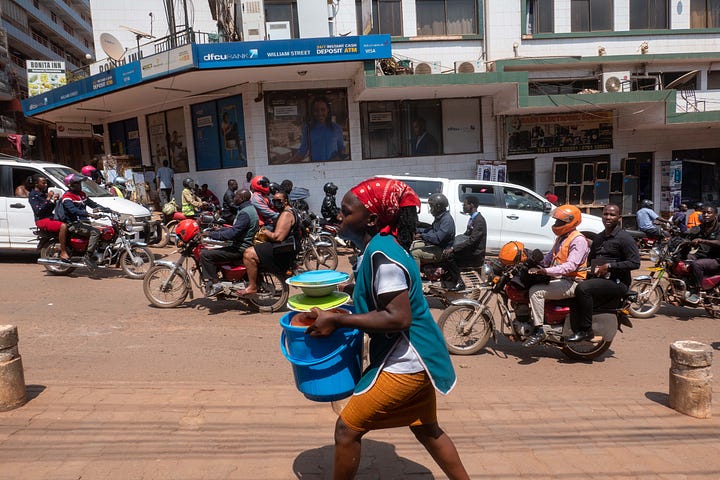
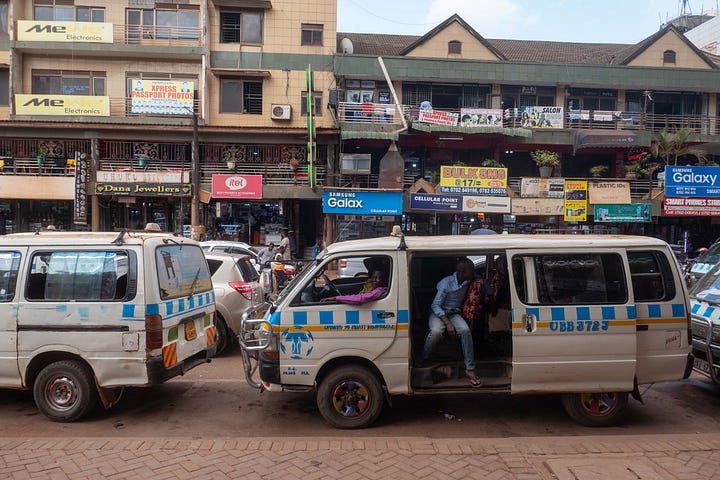
The next morning I began to understand the foolishness of what I’d gotten myself into. The idea that I was going to walk ten miles across town, or even five, was absurd. Walking the one mile to buy the necessities for my ten-day stay, since my “Executive Suit” didn’t come with toilet paper, soap, bottled water, or more than two minutes of hot water, turned into an hour-long slog of dodging motorcycles, semis, vans, people balancing anything and everything on their heads (including twenty-foot-long razor sharp metal rods), mud puddles, garbage piles, vendors, chasms, and sickly begging toddlers. By the end of the round trip I was filthy, drenched in sweat, and bordering on heat exhaustion.
Yet I kept at it, building up each day, watching the locals and learning the system. The answer was clear. Nobody walks ten miles, and if they do, it’s motivated by desperation, not curiosity, because they’re so broken they don’t even have the ten cents for one of the ubiquitous shared vans, the Matatus, that slowly run up and down the main streets. Or a dollar for a Boda-boda, the even more ubiquitous motorcycles that can charge more because they’re a clever solution to Kampalas hours-long jams. You jump onto the back of a 150cc dirt bike, hold on, and let the driver hack the traffic— weave around semis, zoom down the mud shoulder, zigzag around pedestrians, or even drive on the wrong way the side of the road, because it’s the spirit of the law that matters. Whatever it takes to get you wherever your going as quickly as possible.
Getting anywhere in Kampala becomes a game of time, risk, and cost analysis. Walking is the cheapest, slowest (although not always for distances under two miles), but also dangerous. You have to be constantly alert, and if you aren’t, you might come shockingly close to getting speared in the back by lumber jutting from a passing Boda-boda (like me). Or you might get slapped in the head by a side-view mirror. Or you might slip into an open sewer as the ground gives. Or you might get your ankles tangled in rusty razor-wire.
What you don’t have to worry about is other people. Nobody has come anywhere close to threatening me, although they have, through their curiosity, interest, and sometimes genuine and other times calculating kindness, slowed me down.
There is an increased viscosity that comes with being white in Kampala, a retardation of movement and progress from all the hands reaching out to touch you, all the requests to sell you something, all the offers to help you, all the shouts of friendship, or all of the above.
I am a mark, an attraction, that everyone globs onto, because I am a white, an outsider, a Muzungo, something I’m constantly told, and the source of endless fascination.
Being a Muzungo means I am very rich, very uptight, always in a hurry, pushy, but mostly naive. I am an over-educated fool, removed from the realities of life, and easily scammed. All these things I’ve been told directly, without a drop of irony, or embarrassment. As one young man I was walking with said, it’s also why I get dirty,
Me to him: I’m always impressed with how well put together people are here. They live in cement brick homes without indoor plumbing. The streets are dirt with rivers of mud. The air is choked with smog and smoke. And yet a woman walks around in spotless crisp clothes, immaculate heels, done up hair, and a face painted to perfection. I get back after ten minutes walking and I’ve got dirt everywhere. Including in my mouth
Him to me: That’s because you muzungu are dirty.
Me: what????
Him: You don’t know how to stay clean. You don’t respect your body. You don’t know how to avoid dirt, because you have removed yourself from it and wash up with a hundred tanks of water.
All the hands reaching out to me, all the pestering, while annoying, is also completely understandable. I am a highly visible outsider, and so almost certainly have more money, more connections, and more power than ninety-nine percent of Ugandans. I can help them, and since I’m here, I probably want to, or should. I saw the same thing in Senegal, although in Kampala while the requests are equally blunt, they are far less aggressive.

